I love the little line in the gospel reading that says, “Take care, then, how you hear.” It almost seems like a throw-away line, but really, I believe, it’s an essential instruction from Jesus. We disciples are to take care how we hear. Not what we hear, although that’s probably part of it, but how we hear.
So how do we hear the words of the gospel? Do we hear them as something that seems nice but doesn’t really affect us? Do those words fly over our heads or go in one ear and out the other? Do we hear them at Mass, and then live however it is we want, seeming to ignore what we’ve just heard?
Or, do we really hear the Word of the Lord? Does the gospel get into our head and our heart and stir things up? Do the words of Jesus get our blood flowing and our imaginations racing? Does hearing the gospel make us long for a better place, a more peaceful kingdom, a just society? We are not just hearing words about Jesus, we are hearing Jesus, we are experiencing the presence of God right here, right now, among us. If we open the door of our ears and our hearts, we might just find God doing something amazing in us and through us.
Take care, then, how you hear.
Category: Liturgy
-
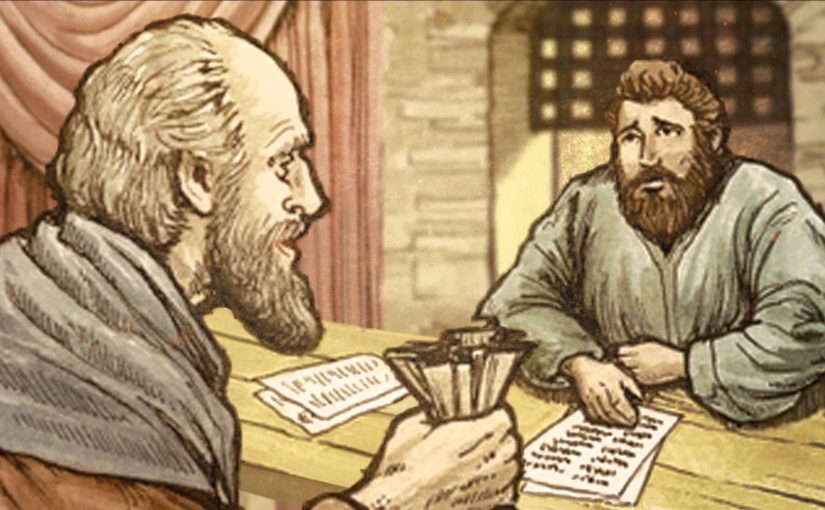
The Twenty-fifth Sunday of Ordinary Time
What an odd parable we have in today’s Gospel reading! To our modern ears, this makes no sense; it’s almost as if Jesus is extolling immoral conduct. But, whenever we find a piece of scripture that bothers us, I always find that it means I should pay attention, because the Lord has something important to say. Not only that, but today’s reading comes on the heels of last week’s reading about the lost sheep, the lost coin, and the prodigal son. In my homily last week, I mentioned that Jesus used all of these “trick question” stories to get the people’s attention. I think this week’s parable is a lot like that. So let’s dive in and figure this out together.
The steward in the parable seems to be some kind of high-ranking assistant to the rich man. He has enough authority that he is able to rewrite the deals people had made with the man, such that the rich man would have to honor them. But apparently he has not been doing his job, because he learns that the rich man is about to fire him. Much as anyone would do when they learn of that impending crisis, he takes stock of his abilities: he isn’t strong enough for manual labor, and his position has made the prospect of begging too humiliating to bear.
Given that state of affairs, he knows that he has to start cutting deals with the rich man’s clients so that they will be more likely to help him when he is looking for it after he is fired. So he basically writes off a large chunk of their debts to the rich man. Now how he could do that is anyone’s guess. Some scholars say that he just wrote of the commission he himself would have received for collecting the debt. Others say that he wrote off the usurious interest the master had been charging. Since we don’t know the answer, we have to assume that detail was either understood by Jesus’ hearers or simply unimportant to the story itself.
Now the next statement is difficult for biblical scholars to unravel: “And the master commended that dishonest steward for acting prudently.” Are those words part of the parable? In other words, did the rich man call the servant dishonest, and if so, was this what was about to get the steward fired? It doesn’t seem like that is the case. The Greek word used for “master” here is kyrios, or Lord, which usually refers to Jesus in the gospels. So it seems like Jesus is the one who is calling the servant dishonest, and that serves to squash the impression that Jesus was commending the steward for his dishonest dealings; clearly that was not the case.
But having said all that and having waded our way through the strangeness of this parable, the question remains: what is the point? Certainly Jesus isn’t saying that we should deal deceitfully with others, be they poor or rich. I think what Jesus wants us to understand is that, in the vast scheme of things, there is something more important than money. For the steward on the eve of his unemployment, the money owed to his boss was far less important than his ability to live after he was let go. Perhaps all of this is summed up best by the words that come at the end of the gospel reading: “You cannot serve both God and mammon.”
Here’s the line that I think should really get us thinking: “For the children of this world are more prudent in dealing with their own generation than are the children of light.” So I think our Lord is reminding the people that they are to be children of light, and they’re not doing it very well. This Gospel parable is paired with a very strong proclamation from the prophet Amos, who never minces his words. His central message was that the worship of the people Israel was completely messed up, because they dishonored God in their daily living, in every possible way, at every possible moment. Today’s first reading is evidence enough of what Amos was sent to preach: he details the various ways the rich cheated the poor who came to buy life’s sustenance from them. And he concludes with the very haunting words: “Never will I forget a thing they have done!”
So I think the message here is that the world around us knows well enough how to deal with dishonest wealth. We see dishonest dealings go on all the time: deals that use the poor for their labor, while the poor suffer without the basic things that we couldn’t live without. But we are children of light. We should know how to take care of the wealth that we have in an honest way so that we and all those in need can live with dignity. The children of light serve God, not mammon, which is the love of money at the expense of every other good thing.
So our reflection this week should lead us to taking stock of how we use the money we have been given to steward. Have we been careful to take care of the poor? Have we used the gifts we have for the good of others? Or have we hoarded what we have been given and denied others what is rightfully theirs? God sees all of that, and would that he would see us living as children of light.
-
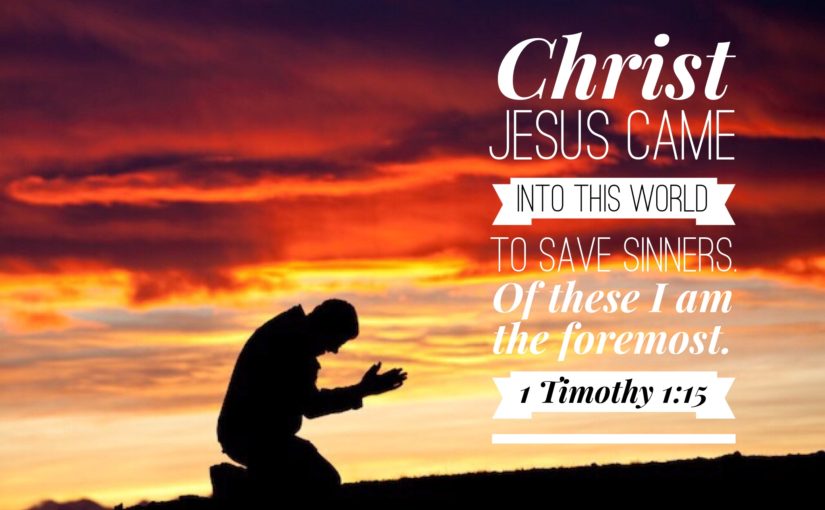
The Twenty-fourth Sunday of Ordinary Time: It’s All About Mercy
Mercy. It’s all about mercy – thank God.
You may have heard that little voice that tries to tell you how unworthy you are. “You’re a sinner, how can you sit there in church?” “Don’t tell me how to live my life; you’re worse than I am!” “How can you even ask God to forgive you after everything you’ve done?” That little voice might come from someone we know, or maybe it’s just that nagging voice in the back of your head. But we’ve all heard it in some way or another at some time in our lives. In a way, the voice is right. We are sinners. There is no denying that. Saint Paul makes it very clear in today’s second reading: “Christ Jesus came into this world to save sinners,” he says. “Of these I am the foremost.” That’s true of all of us, certainly. But at a very fundamental level, the voice is dead wrong. Because we are never unworthy of mercy, we are never far from God’s love.
Jesus knows this is hard for us to accept, so he tells us three stories. Each of these stories is intended to shock us into seeing how radical God’s mercy really is. Now, honestly, to all of us who are far removed from the culture and everyday life of people in Jesus’ day, we might not get how shocking they are, until we really think about it.
In the first story, he asks a ludicrous question: “What man among you having a hundred sheep and losing one of them would not leave the ninety-nine in the desert and go after the lost one until he finds it?” The answer to that question is approximately zero! Because if he leaves the other ninety-nine behind to go after the lost one, he’ll have ninety-nine new problems when he returns! They’ll all be gone. So better to cut your losses and keep the other ninety-nine together. But God is not like the prudent shepherd. He will relentlessly pursue us when we wander astray and become lost and will not rest until he has us – all of us – back in the fold.
The second story isn’t quite as crazy, but it’s still a little out there. “What woman having ten coins and losing one would not light a lamp and sweep the house, searching carefully until she finds it?” On this one, it kind of depends. It depends upon the value of the coin. If it’s a small coin, it will probably cost more to buy oil for the lamp than the coin is worth, so better to wait until the sun comes up, and then sweep the house. One coin doesn’t matter so much that it can’t wait until the light of day. But God is not like that. Finding the lost one among us is absolutely urgent, and we are always worth the lamp oil.
Then we have the wonderful, very familiar parable of the prodigal son, which I prefer to call the parable of the very forgiving Father. Because I think the main character here is the father, and not the son, not either of the sons. Look at how forgiving the father is: First, he grants the younger son’s request to receive his inheritance before his father was even dead – which is so presumptuous that it really feels hurtful. Kind of like saying, “Hey dad, I can’t wait until you’re dead, give me my inheritance now, please.” But the father gives him the inheritance without ill-will. Secondly, the father reaches out to the younger son on his return, running out to meet him, and before he can even finish his little prepared speech, lavishes gifts on him and throws a party.
There is a tendency, I think, for us to put ourselves into the story, which is not a bad thing to do. But like I mentioned earlier, it’s easy to identify with the hard feelings of the older son sometimes. But let’s look at these two sons. First of all, I’ll just say it, it’s not like one was sinful and the other wasn’t – no – they are both sinful. The younger son’s sin is easy to see. But the older son, with his underlying resentment and refusal to take part in the joy of his Father, is sinful too. It’s worth noting that the Father comes out of the house to see both sons. That’s significant because a good Jewish father in those days wouldn’t come out to meet anyone – they would come to him. But the Father meets them where they are and urgently, lovingly, pleads with them to join the feast.
So, both sons are sinful. But remember, this is a parable, and so the characters themselves are significant. They all symbolize somebody. We know who the Father symbolizes. But the sons symbolize people – more specifically groups of people – too. The younger son was for Jesus symbolic of the non-believer sinners – all those tax collectors and prostitutes and other gentile sinners Jesus was accused of hanging around with. The older son symbolizes the people who should have known better: the religious leaders – the Pharisees and scribes. In this parable, Jesus is making the point that the sinners are getting in to the banquet of God’s kingdom before the religious leaders, because the sinners are recognizing their sinfulness, and turning back to the Father, who longs to meet them more than half way. The religious leaders think they are perfect and beyond all that repenting stuff, so they are missing out.
So again, it’s good to put ourselves in the story. Which son are we, really? Have we been like the younger son and messed up so badly that we are unworthy of the love of the Father, and deserve to be treated like a common servant? Or are we like the older son, and do we miss the love and mercy of God in pursuit of trying to look good in everyone else’s eyes? Maybe sometimes we are like one of the sons, and other times we are like the other. But the point is, that we often sin.
But our response has to be like the younger son’s. We have to be willing to turn back to the Father and be embraced in his mercy and love and forgiveness. We can’t be like the older son and refuse to be forgiven, insisting on our own righteousness. The stakes are too high for us to do that: we would be missing out on the banquet of eternal life to which Jesus Christ came to bring us.
And where does that bring us if not to the sacrament of Penance? We have heard the voices in our head or the voices of others. We have sinned, we are not worthy of the Father’s love. But he wants to love us anyway. All we have to do is turn back, by going to confession and being forgiven of our sins. We have fallen; we have failed; we have sinned, but the antidote to that poison is the great healing river of God’s mercy.
I don’t think we can adequately reflect on God’s mercy without recalling the horrible event that happened in our nation fifteen years ago today. On that horrible morning, terror was unleashed on the twin towers of the World Trade Center, on the Pentagon, and in a field in Pennsylvania. Those of us old enough to remember definitely remember how we felt on that horrible day. Fear, anger, sadness, overwhelming grief. How could something like that happen, and what kind of monsters could unleash such evil? It’s really hard to see how mercy can apply to people like that.
Honestly, I don’t know how you deal with the justice of that situation. There are some questions that we’ll never be able to answer on this side of the life of heaven. But we do know that we have been called to mercy: mercy for ourselves and mercy for others. Anger and fear serve no useful purpose and lead to nothing good. But while we hold people accountable for the horrible things they have done, we trust God to give mercy to all of us, because dwelling on anger and fear harm us more than others. We pray for those who have been hurt by the horrors of that day. We pray for the conversion of those who live only to inflict evil. And we pray that God’s mercy will change all of us, making the world a place where things like 9-11 never happen again.
It’s all about mercy. Thank God.
-
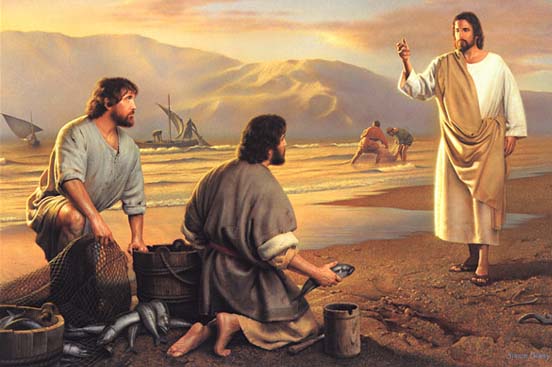
Tuesday of the Twenty-third Week of Ordinary Time
I’ve heard it said that the only one of the disciples Jesus called that day who was actually fit for his job was Judas Iscariot, and we all know how that worked out. We don’t know what God considers qualification for discipleship, we just know that somehow, for some reason, we have all been called to do whatever it is that we are meant to do in life. We probably don’t have all the skills necessary to accomplish it, but that’s okay. If we were able to accomplish everything on our own then we wouldn’t need God, wouldn’t need a Savior.
In just the same way, we are all called to be part of God’s kingdom by making his presence known in what we do or say. We may or may not be able to heal diseases. Maybe we can’t cast out demons, at least in the way Jesus did. Feeding the hungry with miraculous actions may well be beyond us. But we’re not called to be Jesus, only to do what he did. And so it may be enough to look in on a sick neighbor, or sit with someone who is troubled, or make a meal for someone who hasn’t had a good one in a long time.
We tend to think of discipleship as something huge, something way beyond us. But every one of us is called to take it up. As Saint Teresa of Calcutta once wrote, “Very humble work, that is where you and I must be. For there are many people who can do big things. But there are very few people who can do the small things.” Maybe our little work won’t change the world, but it can make things better in our small part of the world, and that may be what we’re called to do.
Thank God that we both need and have his presence in our lives, and that he has called us all to share in the work of discipleship in some way.
-
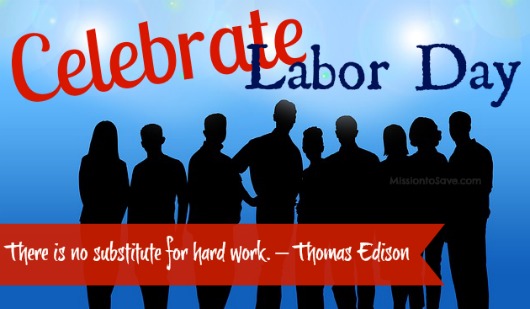
Labor Day
Today’s readings: Genesis 1:26-2:3; Psalm 90; Matthew 25:14-30
One of the things that I remember vividly about my childhood is how hard my parents worked. My Dad worked more than one job at a time for several years. And in his main job, he was with the company for well over forty years, finally retiring from the company he worked for since his late teens. My mother, too, worked outside the home, and still does on a part-time basis. They encouraged me to work as well, and the experience of the work I did in my late teens is something that I carried with me throughout my pre-seminary work years, and continue, really, to benefit from to this very day. And that’s how work is supposed to be: participation in God’s creation, enhancing our human dignity, bringing forth our gifts, and helping us to be better people. Work should also help us to sustain our lives and our families, and to provide for their needs, including health care and retirement. The Church has consistently and loudly taught these truths about work ever since Pope Leo XIII’s ground-breaking encyclical Rerum Novarum, published in 1891.
As we observe Labor Day this year, though, I think we still have work to do on those principles. Far too many people don’t have the resources that work provides. The bishops of our nation publish a yearly Labor Day statement, and this year they write about the disarray in the world of work and the crisis that presents to the family:
“We behold signs that have become too familiar in the years following the Great Recession: stagnant wages, industry leaving towns and cities behind, and the sharp decline in the rate of private-sector organized labor… Millions of families still find themselves living in poverty, unable to work their way out. Poverty rates among children are alarmingly high, with almost 40 percent of American children spending at least one year in poverty before they turn eighteen. Although this reality is felt nation-wide, this year new research has emerged showing the acute pain of middle and rural America in the wake of the departure of industry. Once the center of labor and the promise of family-sustaining wages, research shows these communities collapsing today, substance abuse on the rise, and an increase in the number of broken families. ”
In his address to Congress last year, Pope Francis noted the crisis that is presented to the family in these days: “How essential the family has been to the building of this country! And how worthy it remains of our support and encouragement! . . . In particular, I would like to call attention to those family members who are the most vulnerable, the young. For many of them, a future filled with countless possibilities beckons, yet so many others seem disoriented and aimless, trapped in a hopeless maze of violence, abuse and despair. Their problems are our problems. We cannot avoid them. We need to face them together, to talk about them and to seek effective solutions rather than getting bogged down in discussions. At the risk of oversimplifying, we might say that we live in a culture which pressures young people not to start a family, because they lack possibilities for the future. Yet this same culture presents others with so many options that they too are dissuaded from starting a family.” (Address to Congress, September 24, 2015)
The bishops’ statement is relatively optimistic, citing efforts of solidarity and care for the most vulnerable of society as the bedrock of stabilizing the economy and strengthening the family. They write:
“As the fruits of solidarity and our care for one another increase, as we begin to make real impacts toward policies that help individuals begin stable families and live in accord with their dignity, the tired paradigm that fuels our national politics will be challenged. As Pope Francis has written ‘[e]very economic and political theory or action must set about providing each inhabitant of the planet with the minimum wherewithal to live in dignity and freedom, with the possibility of supporting a family, educating children, praising God and developing one’s own human potential.’ (Pope Francis, Letter to H.E. Mr David Cameron, British Prime Minister, on the Occasion of the G8 Meeting [17-18 June 2013]) With time, we will begin to restore a sense of hope and lasting change that places our economic and political systems at the service of the human person once more.”
Labor Day is in fact a wonderful time to step back and look at the meaning of work. Labor Day reminds us that we don’t have permission to write off human labor as some kind of necessary evil or a commodity to be bought and sold. We are reminded that the economy exists for the good of people, not the other way around. We must truly venerate all labor, that of our own efforts as well as that of others. We must vigorously defend the rights and dignity of workers, particularly of the poor and marginalized. And we must always offer all of this back to our God who created us to be co-creators with him. May we pray with the Psalmist this day and every day, “Lord give success to the work of our hands!”
-
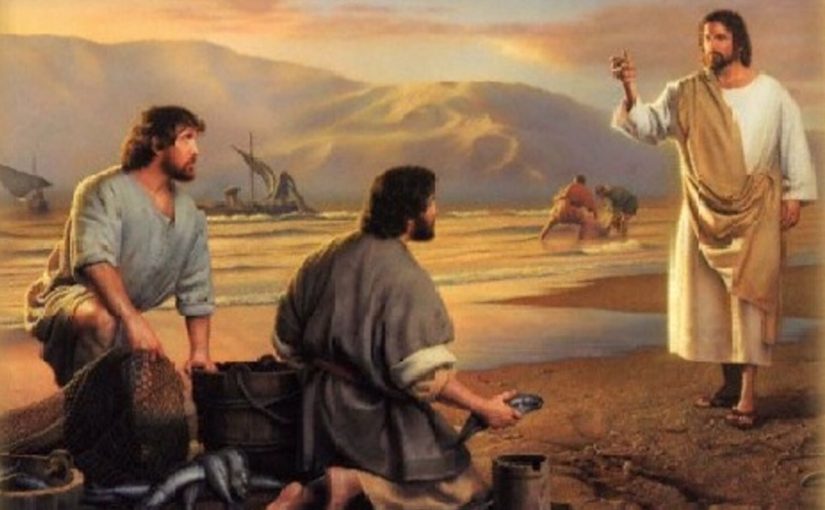
Thursday of the a Twenty-second Week of Ordinary Time
You may have heard the saying, as I have, that “If you want to hear God laugh, just tell him your plans.” It’s so easy for us in our arrogance to think we have everything all figured out. And then maybe God taps us on the shoulder, or shouts into our ear, and sends us in another direction. We’ve all had that happen so many times in our lives, I am sure. And if we’re open to it, it can be a wonderful experience, but it can also be a wild ride at the least, and traumatic at the greatest. This is the experience Paul is getting at when he says in our first reading, “For the wisdom of this world is foolishness in the eyes of God.”
Simon and his fellow fishermen must have been thinking that Jesus fell into the foolishness category when he hopped into their boat, after they had been working hard all night long (to no avail, mind you!), and said, “Put out into deep water and lower your nets for a catch.” What foolishness! But something about Jesus made them follow his instructions, he tapped on their shoulders, shouted into their ears, and they did what he said.
And not only were they rewarded with a great catch of fish, but they were also called to catch people for God’s reign. Talk about God laughing at your plans. They had only ever known fishing, and now they were evangelists, apostles and teachers. And we know how wild a ride it was for them. They never expected the danger that surrounded Jesus in his last days. They never expected to be holed up in an upper room trying to figure out what to do next. They never expected to be martyred, but all of that was what God had in mind for them. And all of it was filled with blessing.
So what foolishness does God have planned for us today? How will he tap us on the shoulder or shout into our ear? Whatever it is, may he find us all ready to leave everything behind and follow him. -
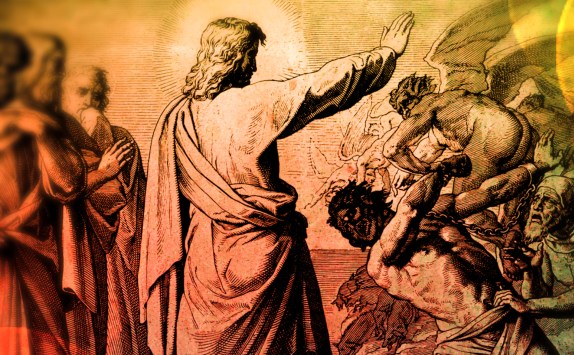
Tuesday of the Twenty-second Week of Ordinary Time
The presence of God, in some ways, is quite often really unwelcome, at least to those who have made their own gods. Saint Paul urges the Corinthians in today’s first reading to be good discerners of this reality; to turn away from the spirit of the world so that they can turn toward the Spirit of God. That’s good advice for us too, of course. In today’s Gospel the demons that possessed the poor man knew who Jesus was and what he came to proclaim. Those demons wanted no part of Jesus, in fact, they wanted him to go away. But of course, Jesus who is the way, the truth and the life will not let the man remain possessed, and the demon flees.
But the demons that oppose God’s presence remain in our world and are quite active. They possess people, institutions, and social systems. They attempt to cloud a respect for life by preaching the so-called truth of “choice.” They attempt to oppress whole peoples and developing nations with greed and rampant consumerism. They attempt to derail justice with corruption, peace with selfishness, respect for authority with a kind of false freedom of expression. The expression of truth in our society is so relativistic and centered around “me.”
But the Jesus will not go away; he will not be overcome by anything; he will be always omnipresent. And we believe that forces of darkness will never have the last word. For the truth will overcome them like the thief in the night, and all that darkness will be put to flight in the light of truth. So may we Christians continue to sing of the Lord’s truth so that all people will continue to be amazed, just like the bystanders at the casting out of the demon. And with the Psalmist, we can rejoice that “The LORD is gracious and merciful, slow to anger and of great kindness.”
-
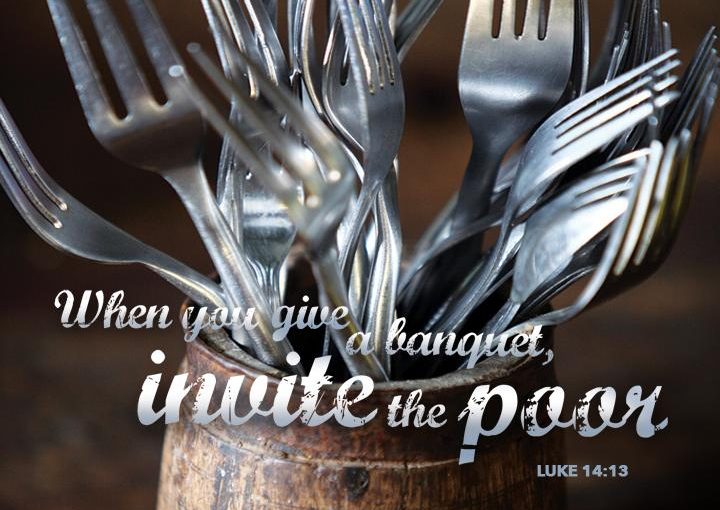
The Twenty-second Sunday of Ordinary Time
You’ve heard of the deadly sins. They are those sins that can really get at us time and time again in our lives and turn us away from God. They are things like lust, gluttony, greed, sloth, wrath and envy. But for each of those deadly sins, there is also a life-giving virtue. Today, our readings focus on humility, which is the life-giving virtue that is the antidote to pride. Of the seven deadly sins, pride is usually considered to be the original and the most serious of the sins. Pride was the sin that caused the angel Lucifer to fall from grace. Pride was the sin that caused our first parents to reach for the forbidden fruit that was beyond them, all in an attempt to know everything God does. A good examination of conscience would probably convince all of us that we suffer from pride from time to time, and sometimes even pervasively, in our own lives. It’s what causes us to compare ourselves to others, to try to solve all our problems in ways that don’t include God, to be angry when everything does not go the way we would have it. Pride, as the saying goes, and as Lucifer found out, doth indeed go before the fall, and when that happens in a person’s life, if it doesn’t break them in a way that convinces them of their need for God, will very often send them into a tailspin of despair. Pride is a particularly ugly thing.
Humility, then, can be the answer to that particularly pernicious sin. But when we think about humility, we might associate that with a kind of “wimpiness.” When you think about humble people do you imagine breast-beating, pious souls who allow themselves to be the doormats for the more aggressive and ambitious? Humble people, we tend to think, don’t buck the system, they just say their prayers and, when they are inflicted with pain and suffering, they just “offer it up.” (Not that offering up our sufferings is a bad thing, mind you.)
But Jesus described himself as “humble of heart,” and I dare say we wouldn’t think of him as such a pushover. He of all people, took every occasion to buck the system and chastise the rich and powerful. He never just let things go or avoided confrontation. But he was indeed humble, humbling himself to become one of us when he could easily have clung to his glory as God. He was strong enough to call us all, in the strongest of terms, to examine our lives and reform our attitudes, but humble enough to die for our sins.
And so it is this humble Jesus who speaks up and challenges his hearers to adopt lives of humility in today’s gospel reading. One wonders why the “leading Pharisee” even invited Jesus to the banquet. If we’ve been paying attention to the story so far, we know that the Pharisee had ulterior motives; he was certainly looking to catch Jesus in an embarrassing situation. But Jesus isn’t playing along with all that. In fact, one can certainly taste the disgust he has for what he sees going on at the banquet.
In our day, banquets are usually put together with thoughtfulness and with a mind toward making one’s guests feel comfortable. If you’ve been involved in a wedding, you know that the hosts try to seat people with those of like mind, with people who might have common experiences. It’s enough to drive a host to distraction, sometimes, because it is such hard work. But in Jesus’ day, the customs were much more rigid. People were seated in terms of their importance, and at this banquet, Jesus watched people try to assert how important they were by the places they took at table. This was all an exercise in pride, and it seems that Jesus was repulsed by it. So he tells them the parable that exhorts them to humble themselves and take the lowest place instead: far better to be asked to come to a more important place than to be sent down to a lower place and face embarrassment.
But there was another aspect of pride taking place here as well. The “leading Pharisee” had obviously invited people who were important enough to repay the favor some day – with one obvious exception – Jesus was decidedly not in a position to do so, at least not in this life. So he tells his host a parable also, exhorting him to humble himself and invite not those who are in a position to repay his generosity, but instead he should invite “he poor, the crippled, the lame, the blind” – and know that because they cannot repay him, he would be repaid at the banquet of the righteous in heaven.
We don’t know how the guests or the host responded to Jesus’ exhortation to practice humility. We do, however, know that Jesus modeled it in his own life. Indeed, he was not asking them to do something he was unwilling to do himself. When he said, “For every one who exalts himself will be humbled, but the one who humbles himself will be exalted” he was in a way foreshadowing what would happen to him. Humbling himself to take up our cross – our cross – he would be exalted in the glory of the resurrection.
The good news is that glory can be ours too, if we would humble ourselves and lay down our lives for others. If we stop treating the people in our lives as stepping-stones to something better, we might reach something better than we can find on our own. If we humble ourselves to feed the poor and needy, to reach out to the marginalized and forgotten, we might be more open to the grace our Lord has in store for us in the kingdom of heaven.
For everyone who exalts himself will be humbled,
but the one who humbles himself will be exalted. -
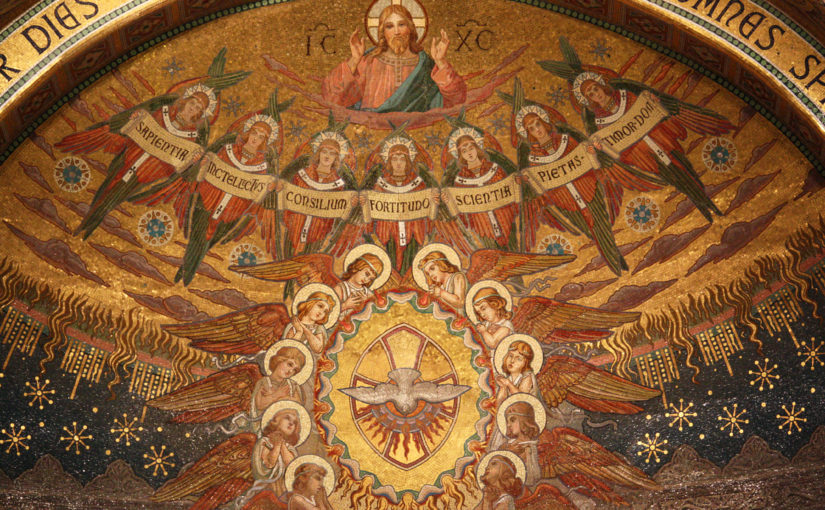
Friday of the Twenty-first Week of Ordinary Time: Mass of the Holy Spirit
Today’s readings
This is the first school Mass of the year, so I celebrated a Mass of the Holy Spirit.I don’t know if you’ve ever had the experience, when you’re talking to someone, that you feel like you’re not both having the same conversation. Or you feel like, even though you’re both speaking English, you’re not talking the same language. Sometimes that happens: you think you’re both talking about the same thing, but very clearly, one or both of you is missing the point.
I think Saint Paul’s message to the Corinthians today might be something like that. They think they know what wisdom is, and I believe they really do know how the world defines wisdom, but the thing is, God’s wisdom is very, very different from the world’s wisdom. God’s wisdom is way beyond anything anyone has ever thought. Because, for God, wisdom looks like that Cross up there. Because the Cross is what the world thinks of as the ultimate defeat. It was a death saved for the most horrible criminals. It was a very public way to put an end to someone’s criminal foolishness.
But God used that horrible thing to make the best thing ever happen. He used the Cross to overcome the worst death ever by raising Jesus up on the third day. The worst death ever became the best life ever, where there is no more pain or sadness or death. It turns out God’s wisdom is very, very wise indeed!
For Jesus in today’s Gospel the call to be truly wise was a bit more simple: be prepared. Just as the wise virgins who had taken the time to buy enough oil to last them through the night were rewarded by getting to join in the marriage feast, so all of us who are wise enough to be a light shining in a dark place will be rewarded with being able to join God’s feast and become one with him.
I think it makes a lot of sense that we talk about wisdom at the beginning of our school year. The whole point of this coming school year is for all of us to grow in wisdom. So we have to be ready to tackle subjects that maybe don’t make a lot of sense to us at first. We might think something new is just foolishness until we actually get it, and then we grow in our ability to learn. And we have to come prepared, knowing that sometimes it doesn’t seem like we’re going to understand what we’re being taught, but persevering, staying with it anyway until it actually makes sense.
For all of this, we have to rely on the Holy Spirit. The Holy Spirit is God’s own spirit, the Third Person of the Blessed Trinity. It is the Holy Spirit that gives us the grace and the gifts to do all the really good things that we want to accomplish and that God wants us to do. And so we begin our year by asking the Holy Spirit to give us wisdom, and the grace to hang in there when things get tough.
But the Spirit’s gifts are more than just wisdom. Saint Paul says to the Corinthians a little later on in his letter:
There are different kinds of spiritual gifts but the same Spirit; there are different forms of service but the same Lord; there are different workings but the same God who produces all of them in everyone. To each individual the manifestation of the Spirit is given for some benefit. To one is given through the Spirit the expression of wisdom; to another the expression of knowledge according to the same Spirit; to another faith by the same Spirit; to another gifts of healing by the one Spirit; to another mighty deeds; to another prophecy; to another discernment of spirits; to another varieties of tongues; to another interpretation of tongues. But one and the same Spirit produces all of these, distributing them individually to each person as he wishes. (1 Cor. 12: 4-11)
And so someone might be able to grasp wisdom or knowledge quickly. Another might be a person of great faith, helping others to trust God when things are tough. Another person might have the gift of healing, maybe helping people when they are hurting physically or emotionally. The point is the Holy Spirit moves us in many different ways, and all of us are given some of the gifts of the Spirit. And we are given those gifts so that we can give them to others.
So as we begin our school year together, we want to pray to the Holy Spirit so that he will give us whatever gifts we need to do whatever it is we are supposed to do. We want to thank the Holy Spirit for those gifts, and promise to use them for our good and the good of the other people he puts in our lives. And we should always thank God for those wonderful gifts, because they make us better, happier people and using them makes our world a better place.
I know a lot of you know the prayer to the Holy Spirit, so if you do, pray it along with me:
Come Holy Spirit, fill the hearts of your faithful and kindle in them the fire of your love. Send forth your Spirit and they shall be created. And You shall renew the face of the earth. Amen.
-

Thursday of the Twenty-first Week of Ordinary Time
When I was little, I often remember my grandmother saying “thank God for small favors!” Now that’s a holy and pious thought, and I’ll have you know my grandmother was certainly holy and pious. But when she said it, it was usually because someone had just done the least they could possibly do, or something they should have done long ago. So the sense of the saying was more like, “could you spare it?” or “well, finally!” Still, I love that phrase, “thank God for small favors” because it reminds us that everything, no matter how big or small, is God’s gift to us, and we should be grateful for it.
One of the most important marks of the Christian disciple is thankfulness. St. Paul was a man of thanksgiving, and we see that theme often in his letters. He may berate his communities when they were missing the point, but he would always also praise them for their goodness, and see that as an opportunity to thank God for giving the community grace. Today, it’s the Corinthian Church that he is grateful for. This is the beginning of his letter to them, and so he greets them in the name of his fellow workers, and then notes the abundance of spiritual gifts that have been bestowed on them. Then clearly he says: “I give thanks to my God always on your account for the grace of God bestowed on you in Christ Jesus…” Because it’s always God at work in the believer and never the believer all on his or her own. It’s grace, and we are thankful for grace.
God continues to work his grace in our communities as well. We see that faith in action in the many ministries of our parishes. But even more than that, we see that faith in action in our workplaces, communities, schools and homes. There is never a time when we are not disciples. We are grateful for God’s grace working in and through us in every situation. The word “Eucharist” means thanksgiving, and so the heart of even the most basic and solemn parts of our worship is thanksgiving. We are thankful for all favors, big and small!
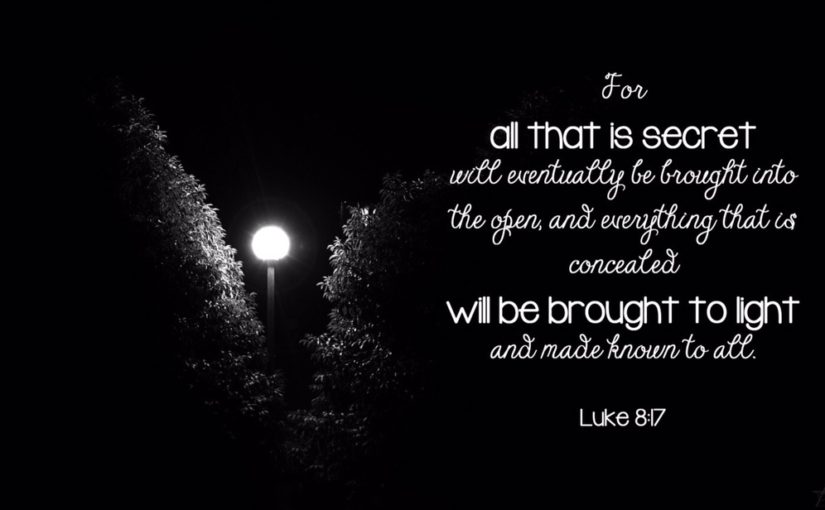
You must be logged in to post a comment.